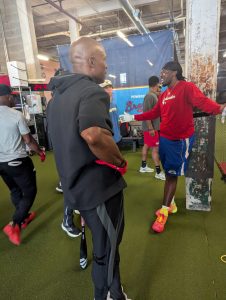 As August kicks off the assessment season, it’s the perfect time to reset expectations and refocus efforts. In youth sports—and in life—success is not just about being seen; it’s about showing up ready for the moment.
As August kicks off the assessment season, it’s the perfect time to reset expectations and refocus efforts. In youth sports—and in life—success is not just about being seen; it’s about showing up ready for the moment.
Too many young athletes enter arenas unprepared for the level of competition they face. That’s when exposure becomes being exposed and the damage can be lasting.
Understanding the three E-levels of development—Entry, Emerging and Elite—is critical for any player, coach or parent looking to build a champion. Each level demands a different mindset and standard and moving through them requires intentional action, not just ambition.
The Three E-Levels of Development
1. Entry Level
Where passion meets potential.
Top 3 Criteria:
- Eagerness to Learn – Shows up with energy and curiosity.
- Effort Over Outcome – Values hard work more than results.
- Exposure to Fundamentals – Needs repetition to build a solid foundation.
Action Plan to Advance to Emerging:
- Experience Wisely – Join local programs that prioritize development over trophies.
- Evaluate Honestly – Focus on feedback from credible coaches.
- Embrace the Process – Build habits—show up early, stay late and stay coachable.
2. Emerging Level
Where consistency is cultivated and confidence grows.
Top 3 Criteria:
- Execution with Intention – Can apply skills in real-time game situations.
- Elevated Understanding – Knows the “why” behind drills and decisions.
- Exposure to Higher Competition – Begins to seek out challenges to test limits.
Action Plan to Advance to Elite:
- Expect More of Yourself – Don’t just meet expectations—study and surpass them.
- Engage with Experts – Attend skills clinics and find a mentor or coach with elite experience.
- Expand the Challenge – Play up a level occasionally, but prepare mentally first.
3. Elite Level
Where excellence becomes the expectation.
Top 3 Criteria:
- Excellence in Execution – Small mistakes are rare. Precision matters.
- Emotional Intelligence – Maintains poise under pressure and leads others.
- Exposure Management – Knows how, when, and where to be seen—and performs when it counts.
Action Plan to Stay Elite:
- Examine the Edges – Constantly evaluate the gaps in your game—because someone else is.
- Elevate Others – Greatness is maintained when you give back. Mentor someone at the emerging level.
- Endure with Purpose – Rest strategically, train deliberately and never forget why you started.
Exposure vs. Being Exposed
(Credit to my wife, Kelli, for this powerful distinction.)
A few days ago, I met a man wearing the gear of a well-known National Baseball Company. I asked if he worked for them. He didn’t. He explained that his team had recently played in one of their tournaments.
“It’s a great experience,” he said, “for the people who are supposed to be there.”
That hit me hard.
His 12U team, still in the emerging phase, had played against elite teams. They didn’t do well. But it wasn’t just about the scoreboard—it was about the expectation. When emerging teams enter elite arenas without elite preparation or elite expectations, they aren’t exposed to the next level—they get exposed as unready.
As my wife Kelli often says, “Exposure can elevate you. But being exposed can unravel you.”
That’s the difference between experience and trauma, between excellence and humiliation.
The tournament wasn’t the problem. The problem was misalignment. And that’s a leadership issue—one that starts with how we define success and prepare our players for the moment.
Compete at the Right Time for the Right Reason
As we move through the Assessment Phase (August–October), it’s time to try, test and tweak. Not to win at all costs—but to learn what’s real and what’s not. Come November, we enter the Engagement Phase—a season for building strength and habits based on what’s been proven to work.
Don’t fear the process. Don’t fake your way into rooms you’re not ready for.
- Because excellence isn’t showing up everywhere.
- Excellence is showing up ready.
Ask Yourself:
- Am I being exposed to the right level of competition—or am I being exposed as unprepared?
- Am I chasing attention or chasing alignment?
- Am I in this to win moments—or to win long term?
There’s a difference between being seen and being significant.
Choose wisely. Train intentionally. Stay ready.
Remember: Intelligence tops being smart.
For more information, visit www.diamonddirectors.com today.
If you found this inspiring and thought-provoking, or if you have any questions, comments or concerns, add me on Discord and let’s go deeper.
C.J. Stewart has built a reputation as one of the leading professional hitting instructors in the country. He is a former professional baseball player in the Chicago Cubs organization and has also served as an associate scout for the Cincinnati Reds. As founder and CEO of Diamond Directors Player Development, C.J. has more than 22 years of player development experience and has built an impressive list of clients, including some of the top young prospects in baseball today. If your desire is to change your game for the better, C.J. Stewart has a proven system of development and a track record of success that can work for you.

Leave a Reply